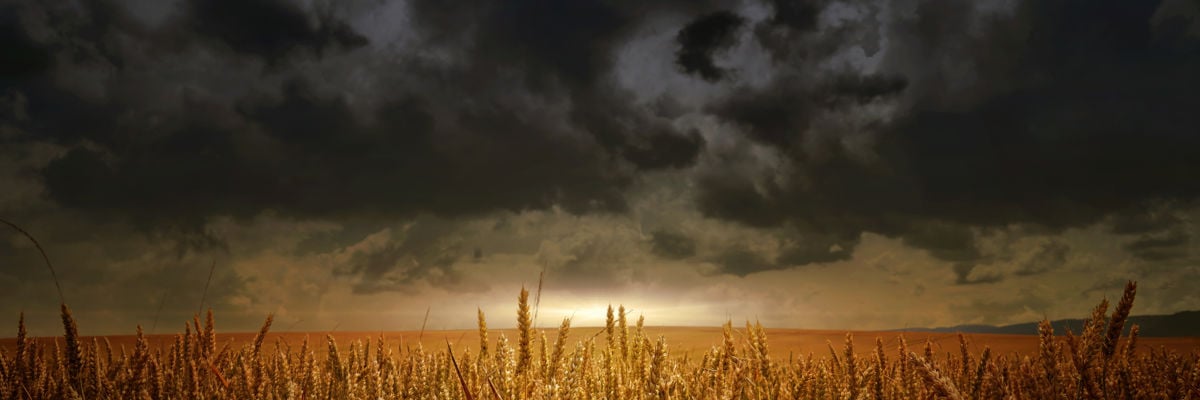
“Fear not, little flock, for it hath pleased your Father to give you a kingdom” (Luke 12:32, DRE).
The pithy warmth of this older translation paints the Father with generosity and love. He gives us his good gifts not because he has to, or because it is reasonable, or correct, but first and finally because it is “[his] good pleasure” (KJV, RSV, et al.). The Father takes delight in giving his children gifts. The Son, in telling us this, shares in his Father’s delight. The disciples are his “little flock,” the sheep cared for and provided for by the Good Shepherd.
It is this relationship of unconditional and unmerited love that stands behind the entire Christian ethical vision. If this is how God looks on us, how God provides for us, we can face trials and persecution, give generously to the poor, do the right thing even when it hurts, and refuse to worry about what happens tomorrow.
But the images given today focus less on moments of crisis—on how to persevere when we’re under attack, resist extreme temptations, or fall into a panic over situations of high anxiety. These stories are all about learning to wait, to stay vigilant, even when the waiting seems long and boring.
One of the Lord’s metaphors, the servants waiting for the master’s return from a wedding, shows a situation of uncertainty. The Fathers often read the master here as Christ coming back after ascending into heaven. We know that he will return, but we do not know when. “No one knows the day nor the hour.” Likewise, we are encouraged to be prepared for a thief coming in the night. Does this mean we aren’t allowed to sleep? That we should be waiting by the back door all the time with a baseball bat?
The difficulty of these scenarios is rather different from the difficulty of crisis. Compare the child who stubs his toe or scrapes his knee who runs crying to Mom or Dad and is quickly comforted with a kiss and a bandage. That’s one thing. It’s another when Mom or Dad is nowhere to be found, when nothing particularly bad is happening, but there’s a mounting anxiety and uncertainty about what could happen. Perhaps a babysitter or sibling assures him that Mom will be back soon, that there’s nothing to worry about, but he may not even be able to hear such comforts.
Such feelings and worries are more or less natural depending on development, age, and circumstance. Likewise in the Christian life, this is an enormous part of maturity: How do we cope with uncertainty? How do we go on when we’re not sure what comes next? Sometimes we may even be tempted to manufacture some enemy or problem so that we can find a way to focus our energies, but it will not aid us in our need for patient waiting.
These Gospel images about the coming kingdom and the return of the Lord can, if we’re honest, be less attractive than the more dramatic depictions elsewhere about the apocalyptic end of history. At least with the great beast and its blasphemies you sort of know what you’re getting. And maybe that’s part of the point here, because it is all too easy for us to convince ourselves that all this watching and waiting for the kingdom really has nothing to do with us. Peter Kreeft gives us this sharp reminder: “You may think that you will not be alive when that happens, but you are wrong. You certainly will, because you will certainly die, and your death is the end of the world for you, the end of your world, and it is when you will meet Christ.”
Our brief reading from Wisdom is a somewhat cryptic selection in the modern lectionary. Its reference to Passover, though, should recall to us the whole character of the original Passover, which was expectant waiting. The Israelites in Egypt were told to eat with their loins girded, packed and ready to travel. The use of unleavened bread was and remains a powerful sign of this vigilance. There was not even time to let the dough ferment and rise.
In Jewish tradition, at least, the symbol of unleavened bread remained a seasonal sign, a particular remembrance of the Passover. It is interesting, then, that this sign has become, at least for those of us in the Latin Church, an enduring mark of ordinary Christian life. Often it doesn’t feel like that. But the Passover of Christ’s death and resurrection, renewed and made present at each Mass, suggests that the vigilant expectation of the Exodus should be for us the norm. We should eat this meal as if it were our last. We should prepare for this meal as if it were our last.
And we should take seriously the metaphors given to understand what proper kingdom vigilance means. The fact that a thief may come in the night doesn’t mean we never get to sleep or rest or enjoy ourselves. We just need basic precautions: reasonable walls, doors, and prudence. This, in spiritual terms, comes down to seeking true virtue, which is always a balanced mean between opposing vices: we neither become consumed with worry nor become lax. Rather, we focus first on those most basic disciplines that Holy Church gives us: going to Mass, going to Confession, finding ways to practice the works of mercy. In other words, the servants should not leave the house, which is to say the Church, to wander off and do their own thing. If we’re staying close to the sacraments, we are placing ourselves in a situation where, like the waiting servants, we are not so distracted with our own temporal affairs that we fail to notice that the Lord is on the doorstep calling for us.
While a proper fear of the Lord may keep us alert, a recognition of the Father’s abiding love for us should in a similar way guard us from falling into needless anxiety. He is not, in the end, a thief in the night! His appearing will only feel like a thief in the night if we forget who he is and who we are. So the ordinary disciplines of the Christian life aren’t just some kind of military preparation for battle, they are just the ordinary disciplines of love, the disciplines of staying near to the one who loves us so that we can remember his voice and his calling to us.
Though the fate of the unready servants is a hard warning, the promise to the servants who stayed ready is quite remarkable: “Blessed are those servants whom the master finds awake when he comes; truly, I say to you, he will gird himself and have them sit at table, and he will come and serve them.” Perhaps it goes without saying, but this is a very unusual scene! The Master becomes the servant.
Again, the hard words of warning should not appear to us as some great angry reminder of God’s wrath, but rather of the extremity of the Father’s love. It is this enormous condescension that warrants our constant attention and love in this life, for our faithfulness will be rewarded in a way that far outstrips its worth.
Let me close with one of Gerard Manley Hopkins’s great reminders of this theme—his little poem “Easter Communion,” written just before his entrance into the Catholic Church. Here, he suggests, the Lenten disciplines do not somehow balance out the joys of Easter; rather, they give way to the overwhelming goodness of God’s triumph:
God shall o’er-brim the measures you have spent
With oil of gladness, for sackcloth and frieze
And the ever-fretting shirt of punishment
Give myrrhy-threaded golden folds of ease.
Your scarce-sheathed bones are weary of being bent:
Lo, God shall strengthen all the feeble knees.
Again hear these words of the Lord: “Fear not, little flock, for it hath pleased your Father to give you a kingdom.”



